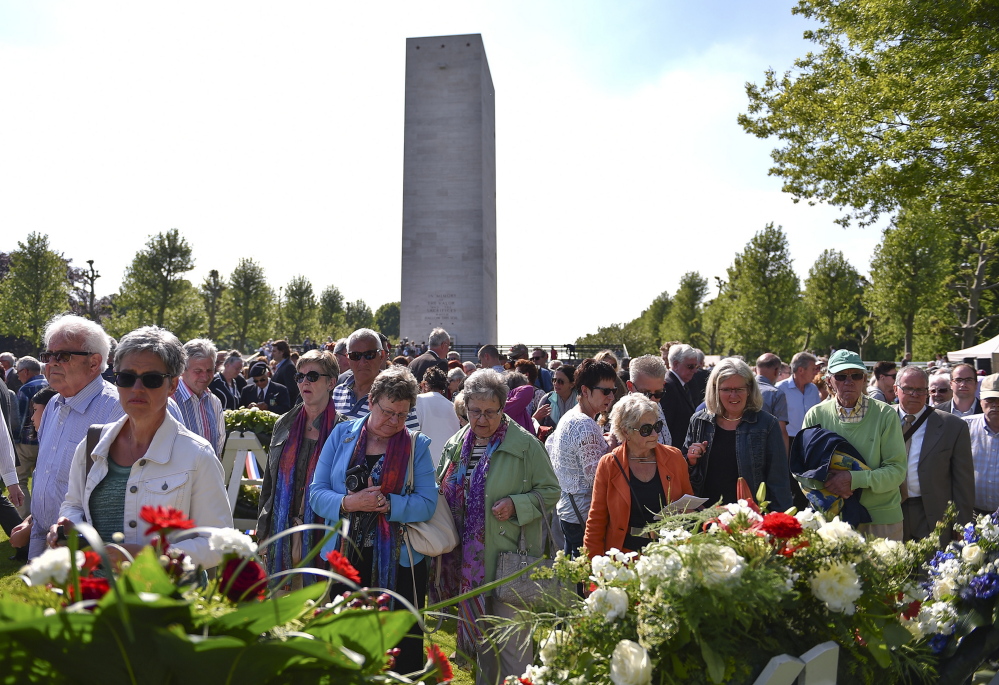MARGRATEN, Netherlands — They haven’t forgotten. For 70 years, the Dutch have come to a verdant U.S. cemetery outside this small village to care for the graves of Americans killed in World War II.
On Sunday, they came again, bearing Memorial Day bouquets for men and women they never knew, but whose 8,300 headstones the people of the Netherlands have adopted as their own.
For the American relatives of the fallen, it was an outpouring of gratitude almost as stunning as the rows of white marble crosses and Jewish Stars of David at the Netherlands American Cemetery. Each grave has been adopted by a Dutch or, in some cases, Belgian or German family, as well as local schools, companies and military organizations. More than 100 people are on a waiting list to become caretakers.
At the cemetery’s annual commemoration, 6,000 people poured onto the 65-acre burial grounds just a few miles from the German border, including scores of descendants of American war dead who had traveled here from all over the United States. They were eager to pay tribute to parents or grandparents who had died to defeat the Nazis. But they also wanted to thank the Dutch families who had been tending the graves of their loved ones, often passing the responsibility from one generation to the next.
For Arthur Chotin, 70, who had come from Annapolis, Maryland, to finally meet the couple caring for his father’s resting place, the devotion of the Dutch was a source of awe.
“What would cause a nation recovering from losses and trauma of their own to adopt the sons and daughters of another nation?” asked Chotin on Sunday. “And what would keep that commitment alive for all of these years, when the memory of that war has begun to fade? It is a unique occurrence in the history of civilization.”
The bodies arrived in a procession of trucks and trailers. Everyone in Margraten could smell the death. It was November 1944, two months after the village’s 1,500 residents had been freed from Nazi occupation by the U.S. 30th Infantry Division.
But the war wasn’t over. In late 1944 and early 1945, thousands of American soldiers would be killed in nearby battles trying to pierce the German defense lines. Booby-traps and heavy artillery fire, combined with a ferocious winter, dealt major setbacks to the Allies, who had already suffered losses trying to capture strategic Dutch bridges crossing into Germany during the ill-fated Operation Market Garden.
Now, the U.S. military needed a place to bury its fallen. The Americans ultimately picked a fruit orchard outside Margraten.
Right from the start, Margraten embraced the Americans. The town’s mayor invited the company’s commanders to sleep in his home, while the enlisted men slept in the schools. Later, villagers hosted U.S. troops when the men were given rest-and-recuperation breaks from trying to breach the German frontier defenses.
“After four dark years of occupation, suddenly (the Dutch) people were free from the Nazis, and they could go back to their normal lives and enjoy all the freedoms they were used to,” explained Frenk Lahaye, an associate at the cemetery. “They knew they had to thank the American allies for that.”
Between late 1944 and spring 1945, up to 500 bodies arrived each day, so many that the mayor went door to door asking villagers for help with the digging.
Gerda Roebroeks-Nelissen, 84, keeps a photo of one American soldier, Ohioan Henry Wolf, on a mantelpiece by a lit candle. Wolf and a few other soldiers stayed with her family after the liberation, when she was 13 years old.
“For my father, Henry was like a child of his,” she remembered.
He was devastated after Wolf was killed in Germany on June 11, 1945. The private’s body was brought back to Margraten. Roebroeks-Nelissen’s family has cared for Wolf’s grave ever since.
They aren’t responsible for cutting the grass or cleaning the grave’s marble cross – that’s the job of the American Battle Monuments Commission, the federal agency that oversees the 25 official U.S. cemeteries abroad. Instead, adopters periodically stop by their chosen graves, delivering flowers on soldiers’ birthdays, dates of death, Christmas, Memorial Day.
Send questions/comments to the editors.



Success. Please wait for the page to reload. If the page does not reload within 5 seconds, please refresh the page.
Enter your email and password to access comments.
Hi, to comment on stories you must . This profile is in addition to your subscription and website login.
Already have a commenting profile? .
Invalid username/password.
Please check your email to confirm and complete your registration.
Only subscribers are eligible to post comments. Please subscribe or login first for digital access. Here’s why.
Use the form below to reset your password. When you've submitted your account email, we will send an email with a reset code.